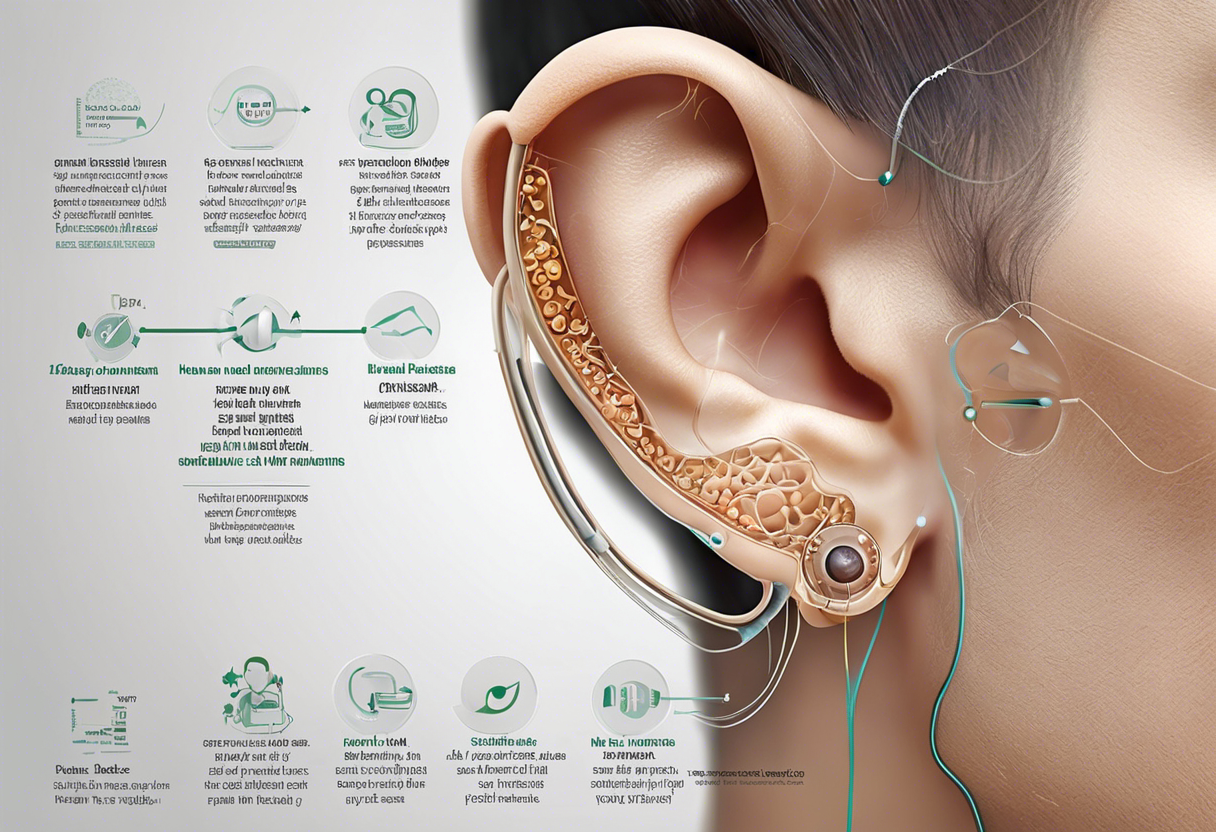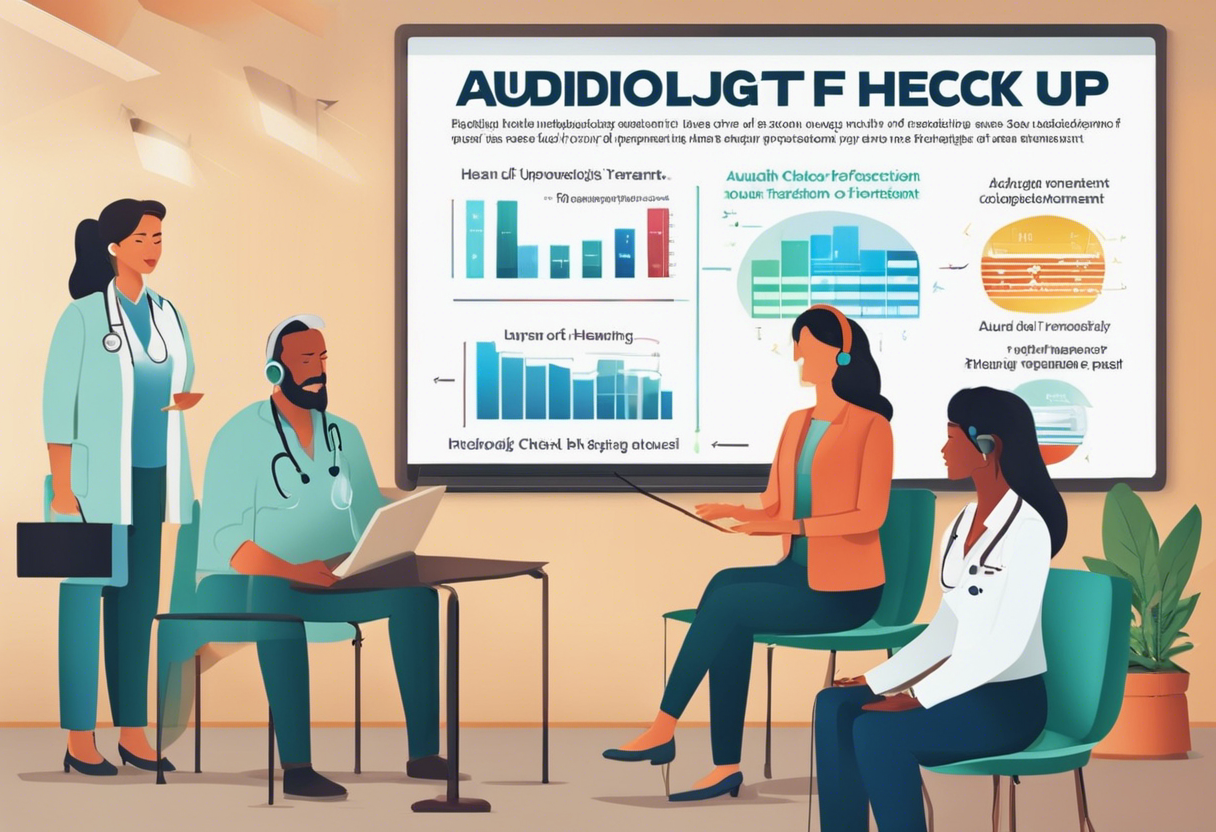
Tips for Preventing Hearing Loss

As someone who values the importance of hearing health, I have gathered some valuable tips to help prevent hearing loss. By incorporating these preventative measures into your daily routine, you can protect your ears and maintain good hearing for years to come.
- Lower the volume: Whether enjoying music, watching TV, or using headphones, it’s important to keep the volume at a reasonable level. Exposing yourself to loud sounds for prolonged periods can lead to hearing damage. Remember to take regular breaks from noise and turn down the volume when possible.
- Protect your ears: When engaging in activities with high noise levels, such as attending concerts, using power tools, or riding motorcycles, always wear ear protection. Investing in earplugs or earmuffs can significantly reduce the risk of noise-induced hearing loss.
- Be mindful of recreational activities: Certain recreational activities, such as shooting or playing in a band, can expose you to hazardous noise levels. Using specialized ear protection specifically designed for these activities can help minimize the impact on your hearing.
- Maintain ear hygiene: Keeping your ears clean and dry is essential for preventing infections, which can lead to hearing damage. Avoid inserting objects, such as cotton swabs, into your ear canal, as this can push wax further in and potentially cause harm. Instead, gently clean the outer part of your ear with a clean cloth.
- Get regular check-ups: Lastly, scheduling regular hearing check-ups with a professional audiologist is crucial for monitoring your hearing health. They can detect any early signs of hearing loss and provide appropriate guidance and treatment options.
By following these simple tips, you can take proactive steps towards preventing hearing loss and maintaining optimal hearing health. Remember, preserving your hearing today will allow you to enjoy the sounds of life to the fullest in the future.
The Role of Diet and Nutrition in Hearing Health

Proper nutrition plays a crucial role in maintaining overall health, including the health of our hearing. A well-balanced diet can support the optimal function of the auditory system and help prevent hearing loss. Here are some tips to incorporate a healthy diet for improved hearing health:
- Include antioxidant-rich foods: Antioxidants play a significant role in protecting our hearing cells from damage caused by free radicals. Include foods like dark leafy greens, berries, nuts, and seeds that are rich in antioxidants to promote ear health.
- Consume Omega-3 fatty acids: Omega-3 fatty acids have anti-inflammatory properties that can help reduce the risk of age-related hearing loss.
- Avoid excessive salt intake: High salt consumption can lead to fluid retention in the body, including the ears, which can contribute to hearing problems. Limit processed and salty foods in your diet and opt for healthy, low-sodium alternatives instead.
- Stay hydrated: Drinking an adequate amount of water can help maintain the health of your entire body, including your ears. Proper hydration ensures that the delicate structures inside the ear receive proper nutrients and stay functioning optimally.
- Manage blood sugar levels: Uncontrolled diabetes can be detrimental to hearing health.
By focusing on a diet rich in antioxidants, Omega-3 fatty acids, and low in salt, along with maintaining good hydration and managing blood sugar levels, we can support the long-term health of our auditory system. Incorporating these dietary habits into our daily lives can contribute to improved hearing health and overall well-being.
Incorporating Exercise for Better Hearing

Regular exercise has numerous benefits for overall health, and it can also have a positive impact on hearing health. As I prioritize my hearing health, I understand the importance of incorporating exercise into my daily routine. Here are some ways I can leverage exercise for better hearing:
- Cardiovascular exercise: Engaging in activities that elevate my heart rate, such as jogging, cycling, or swimming, improves blood circulation throughout the body, including the ears. This increased blood flow can enhance the delivery of oxygen and essential nutrients to the auditory system, promoting better hearing.
- Yoga and meditation: Stress has been linked to hearing loss and tinnitus. By practicing yoga or engaging in meditation, I can manage stress levels and promote relaxation. These activities can also improve blood circulation and reduce inflammation, which can have a positive impact on my hearing health.
- Strength training: Incorporating strength training exercises into my fitness routine can indirectly benefit my hearing health.
- Balance and coordination exercises: Many individuals with hearing loss also experience issues with balance and coordination.
- Regular breaks during high-intensity workouts: Excessive noise levels during intense workouts or fitness classes can potentially damage my hearing. Taking regular breaks and stepping away from loud environments can prevent unnecessary exposure to loud sounds and protect my hearing.
By incorporating exercise into my daily routine, I not only maintain overall health but also promote better hearing.. Remembering to take regular breaks during intense activities is also crucial. With these strategies, I can take proactive steps towards maintaining optimal hearing for years to come.
The Impact of Stress on Hearing and How to Manage It

Stress has a significant impact on our overall health, and this includes our hearing. When we are stressed, our bodies release cortisol, a hormone that can have negative effects on the delicate mechanisms of our ears. Prolonged stress can lead to a variety of hearing-related issues such as tinnitus, heightened sensitivity to sound, and even hearing loss.
Managing stress is crucial for maintaining good hearing health. Here are some strategies I find helpful:
- Practice relaxation techniques: Engaging in relaxation techniques such as deep breathing, meditation, or yoga can help reduce stress levels and promote overall well-being. Taking a few moments each day to focus on relaxation can have a positive impact on our hearing health.
- Exercise regularly: Physical activity not only boosts our mood but also helps reduce stress. Regular exercise can improve blood circulation and promote the health of our auditory system. Aim for at least 30 minutes of moderate exercise most days of the week.
- Prioritize self-care: Taking care of ourselves is essential for managing stress. Make sure to get enough sleep, eat a balanced diet, and engage in activities that bring joy and relaxation. By prioritizing self-care, we can minimize the negative effects of stress on our hearing.
- Seek support: Talking to someone about our stressors can be incredibly helpful. Reach out to friends, family, or a therapist to discuss your concerns and find healthy ways to cope with stress. Having a support system can make a significant difference in managing stress effectively.
- Limit exposure to loud noises: In times of stress, our ears may become more sensitive to sound. To protect our hearing, it’s essential to limit exposure to loud noises, such as loud music, concerts, or noisy environments. If exposure to loud sounds is unavoidable, use earplugs or earmuffs to reduce the risk of damage.
By implementing these strategies to manage stress, I have found that my hearing health has improved. Taking care of our overall well-being is key to maintaining healthy hearing. Remember, it’s essential to seek professional help if you experience persistent hearing problems or have concerns about your hearing.
The Connection Between Sleep and Hearing Health

I firmly believe that a good night’s sleep is crucial for maintaining optimal hearing health. Over the years, I have seen firsthand how lack of sleep can negatively impact our auditory system. Sleep deprivation can not only lead to difficulties in concentration and memory but can also affect our ability to perceive and process sounds.
During sleep, our bodies undergo essential repair and rejuvenation processes. When we lack sufficient sleep, these restorative processes may be disrupted, leading to various hearing issues.
Research has shown a significant correlation between sleep disorders, such as sleep apnea, and hearing loss. Sleep apnea, characterized by repetitive interruptions in breathing during sleep, places additional stress on the auditory system. The resulting oxygen deprivation can cause damage to the delicate hair cells in the inner ear, leading to permanent hearing loss if left untreated.
Additionally, inadequate sleep can have a detrimental effect on our cognitive abilities, including our auditory processing skills. Insufficient sleep can impair our attention span, making it more challenging to focus on conversations and other auditory stimuli. This can result in difficulty understanding speech, especially in noisy environments.
Furthermore, sleep deprivation can contribute to an increase in stress levels, which have been shown to impact hearing health.
To promote good hearing health, I recommend prioritizing quality sleep. Here are some tips to improve your sleep routine:
- Establish a consistent sleep schedule: Go to bed and wake up at the same time each day, even on weekends, to regulate your body’s natural sleep-wake cycle.
- Create a sleep-friendly environment: Ensure your bedroom is dark, quiet, and at a comfortable temperature to promote a restful night’s sleep.
- Limit exposure to electronic devices before bed: The blue light emitted by screens can interfere with the production of melatonin, a hormone that regulates sleep.
- Practice relaxation techniques: Engage in activities such as deep breathing exercises or meditation before bed to promote relaxation and a calm state of mind.
- Avoid stimulants: Limit your consumption of caffeine and alcohol, as these substances can disrupt sleep patterns.
The Benefits of Regular Hearing Check-ups

Regular hearing check-ups can have numerous benefits for maintaining and improving overall hearing health. Here are some key advantages of scheduling regular hearing evaluations:
- Early detection of hearing loss: Regular check-ups allow for the early detection of any changes in your hearing abilities. Identifying hearing loss at an early stage can prevent further damage and allow for timely intervention.
- Prevention of further hearing loss: By monitoring your hearing regularly, healthcare professionals can provide guidance on lifestyle changes and preventative measures to protect your hearing from further damage.
- Improved communication: With regular check-ups, any hearing difficulties can be addressed promptly. This ensures that hearing aids or assistive devices are adjusted properly, allowing for improved communication with loved ones, colleagues, and others in daily interactions.
- Enhanced quality of life: By staying on top of your hearing health, you can maintain an active and fulfilling lifestyle. Regular check-ups can help identify any hearing-related issues that may be affecting your quality of life and enable you to take appropriate steps to address them.
- Early detection of underlying health conditions: Regular hearing check-ups can also uncover any underlying health conditions that may be associated with hearing loss. This can lead to early detection and treatment of conditions such as cardiovascular disease, diabetes, or tumors.
The Dangers of Loud Noise and How to Protect Your Ears

I want to emphasize the importance of protecting your ears from loud noise. Excessive exposure to loud noises can lead to permanent hearing damage and other related health issues. Here are a few reasons why loud noise is harmful to your ears:
- Hearing Loss: Prolonged exposure to loud noise can damage the delicate structures in your ears, leading to hearing loss. This can occur gradually over time, or it can happen suddenly if you are exposed to an extremely loud noise, such as an explosion or a gunshot.
- Tinnitus: Loud noise can also cause tinnitus, which is a ringing, buzzing, or hissing sound in the ears. Tinnitus can be temporary or chronic, and it can greatly impact your quality of life and overall well-being.
- Increased Stress Levels: Exposure to loud noise can also increase stress levels, leading to a variety of negative effects on your health. Chronic stress can affect your sleep, digestion, mood, and overall immune function.
- Interference with Communication: Loud noise can make it difficult to communicate effectively. It can drown out conversations, leading to misunderstandings and frustrations. This can affect your relationships and social interactions.
Now that you understand the dangers of loud noise, it’s crucial to know how to protect your ears. Here are some practical tips to help you preserve your hearing health:
- Use ear protection: Whenever you are in a noisy environment, such as a concert, construction site, or shooting range, wear ear protection. Earplugs and earmuffs are effective in reducing the intensity of loud noises and protecting your ears from damage.
- Limit exposure to loud noises: Whenever possible, try to limit your exposure to loud noises. If you know you will be in a noisy environment, consider taking breaks to give your ears a rest and reduce the overall duration of exposure.
- Keep the volume in check: Whether you are using headphones, earbuds, or speakers, make sure to keep the volume at a reasonable level. Avoid listening to music or other audio at high volumes for extended periods.
- Create a quiet environment: When you are at home or in a quiet space, try to create an environment that is free from loud noises. This can help give your ears a break and promote relaxation.
Remember, prevention is always better than treatment when it comes to safeguarding your hearing.
The Role of Technology in Hearing Health

Using technology can significantly enhance hearing health and improve the quality of life for individuals with hearing impairments. Here are some ways technology plays a crucial role in addressing hearing health:
- Hearing aids: Technological advancements in hearing aids have revolutionized the way individuals with hearing loss experience the world. Modern hearing aids are discreet, comfortable, and equipped with sophisticated features like noise cancellation, wireless connectivity, and automatic adjustments to different environments. These advancements allow for a more natural hearing experience and better communication with others.
- Cochlear implants: For those with severe or profound hearing loss, cochlear implants can provide a solution. These surgically implanted devices stimulate the auditory nerve directly, bypassing the damaged parts of the ear. Improved technology has led to smaller, more efficient implants and better sound quality, enabling individuals to understand speech and enjoy a wider range of sounds.
- Assistive listening devices (ALDs): ALDs utilize technology to improve hearing in specific environments. For instance, telecoils in hearing aids allow individuals to connect directly to compatible devices, such as telephones or assistive listening systems in public venues. ALDs can also include captioning systems for television or portable amplifiers for better hearing in noisy settings.
- Smartphone apps and accessories: Many smartphone apps and accessories are now available to help individuals manage their hearing health. These apps can monitor and track hearing aid usage, facilitate adjustments to hearing aid settings, and even provide personalized sound amplification for specific situations. Innovative accessories enable direct audio streaming from smartphones to hearing aids, making phone calls and listening to music easier and more enjoyable.
- Online resources and support: Technology has opened up a wealth of online resources and communities for individuals with hearing loss. From virtual support groups to forums and educational videos, these platforms provide valuable information, advice, and emotional support for those navigating hearing loss or caring for someone with hearing impairment.
By harnessing the power of technology, we can empower individuals with hearing loss to overcome challenges and lead fulfilling lives.
Conclusion: Taking Control of Your Hearing Health

In conclusion, prioritizing your hearing health is essential for maintaining a high quality of life. By following these tips, you can take control of your hearing health and improve your overall well-being:
- Schedule regular hearing check-ups: Regular visits to an audiologist will ensure any potential hearing issues are detected early on, allowing for timely intervention and treatment.
- Protect your ears: Take steps to prevent hearing loss by wearing ear protection in loud environments and avoiding prolonged exposure to loud noises.
- Practice good listening habits: Pay attention to your surroundings and make a conscious effort to actively listen. Avoid excessive use of headphones and keep the volume at a safe level.
- Take breaks: Give your ears regular rest breaks throughout the day, especially if you’re exposed to continuous noise for long periods.
- Maintain overall health: Ensuring a healthy lifestyle, including exercise, a balanced diet, and managing conditions like diabetes and high blood pressure, can also contribute to better hearing health.
Remember, taking control of your hearing health is an ongoing process. By implementing these strategies, you can protect your hearing and enjoy a vibrant, active life for years to come. Stay proactive, informed, and seek professional help when necessary.
